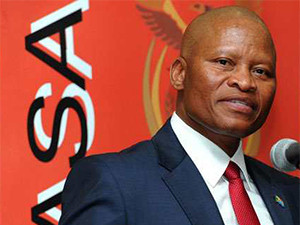
After a long day of arguments, chief justice Mogoeng Mogoeng reserved judgement and adjourned court proceedings in the hearing about the future social grant payments.
As concerns grow that social grants may not be paid on 1 April, Mogoeng and justices of the Constitutional Court (ConCourt) were today presented with heads of arguments to prevent a potential social services disaster that will affect 17 million beneficiaries.
Last week, Mogoeng on behalf of the court issued a directive to the social development minister Bathabile Dlamini and the SA Social Security Agency (SASSA) demanding them to submit responses to his instructions with accompanying affidavits.
The chief justice issued the directive to determine if an agreement had been reached with the current social grants paymaster, the reason the ConCourt was not immediately informed that SASSA would not be able to distribute social grant payments, when it first became apparent that SASSA would not be able to pay grants itself, among other issues.
Today's proceedings marked yet another instance where the court has been required to step in with regards to the issue of social grants. After it emerged that irregular tendering processes were followed in awarding a R10 billion social grants tender to Cash Paymaster Services (CPS), the current payments distributor, the ConCourt declared that contract invalid in 2014.
The court suspended the invalidity declaration on the current paymaster's contract pending its expiration date, which is at the end of this month.
Starting this morning, the ConCourt heard arguments on behalf of The Black Sash, Absa's AllPay, Corruption Watch, SA Post Office, minister Dlamini, SASSA and CPS to determine a roadmap for the future of social services.
The representatives made various suggestions ranging from extending the invalid contract and extending the suspension order of invalidity to ordering a new contract between CPS and SASSA effective on 1 April.
During heads of argument, Mogoeng's frustration was apparent as he pointed out to the critical nature of the situation and how now it is the judiciary that needs to do what they can to address it.
Through her lawyer Andrew Breitenbach, Dlamini said she was remiss. It has been noted that SASSA officials knew from April 2016 that the agency would not be able to pay grants itself, but the minister says she didn't know about the situation for six months and was only made aware of it in October last year.
Mogoeng as well as the other justices questioned why Dlamini sat idly with regards to the social grants debacle and said it was "not acceptable for her to say she was remiss".
The chief justice noted the court can't help but infer that the minister failed to do her job to avoid the current situation. He also wanted to know why SASSA and Dlamini didn't approach the ConCourt as soon as they were advised to do so.
The chief justice questioned why Dlamini should not have to pay legal costs.
Stepping up
Mogoeng also pointed out why it would not be possible for SASSA to pursue paying the grants themselves as they are the agency mandated to do so in the first place.
"If it's not an impossibility to bring all capacities and do the right things, can the court not order SASSA to do what it exists to do?" he asked.
"SASSA is more eligible than any potential contractor...I have reason to believe if SASSA really wants to and is permitted to, it can be contracted to carry out this mandate of payments - not have to contract an outsider."
The chief justice added that they fear if the process to find another distributor goes to tender, the same issue with non-successful bidders might come up again and the court intervening might happen again.
According to Breitenbach, a period of 12 to18 months would be necessary for a new tender bidding process.
In his argument, Breitenbach said his client has requested the court to either impose a new contract between SASSA and CPS for a period of 12 to 18 months rather, or for CPS to continue to render the services of the current contract on the same restrictions.
Arguing for The Black Sash, Geoff Budlender said the executive and the legislature have both failed to carry out its duties in making the minister or SASSA account for the social grants crisis, which is why the human rights organisation has sought the relief of the ConCourt.
Black Sash filed its application to the ConCourt to ensure social grant beneficiaries are not exploited. The human rights organisation entered its application so that the ConCourt can play a supervisory role to ensure grants are not disturbed.
Budlender noted there are no known means by which social payments will be made when the CPS contract expires at the end of the month, and as per the Constitution when other organs of state fail to reach agreement, then the courts must step in.
Representing Black Sash, Budlender said the organisation seeks to know:
*What will happen at the end of March
*The organisation wants effective oversight in respect of grant payments as SASSA has failed to carry out its obligation
*Ensure a situation doesn't arise at end of interim contract
* CPS is "quasi organ of state" and is held to its constitutional obligation
*Protect beneficiaries against abuse of their personal information
On the issue of the ConCourt exercising oversight on SASSA, the minister does not want the court to oversee a new social grants payment deal, and wants the auditor-general (AG) and public protector to monitor a new deal.
During his presentation Breitenbach mentioned once again as per the proposed draft order, the client [Dlamini] wants the AG and public protector to exercise oversight on new contract.
Mogoeng questioned the capacity of public protector to supervise the contract between SASSA and CPS, and noted it is thinly capacitated.
Share